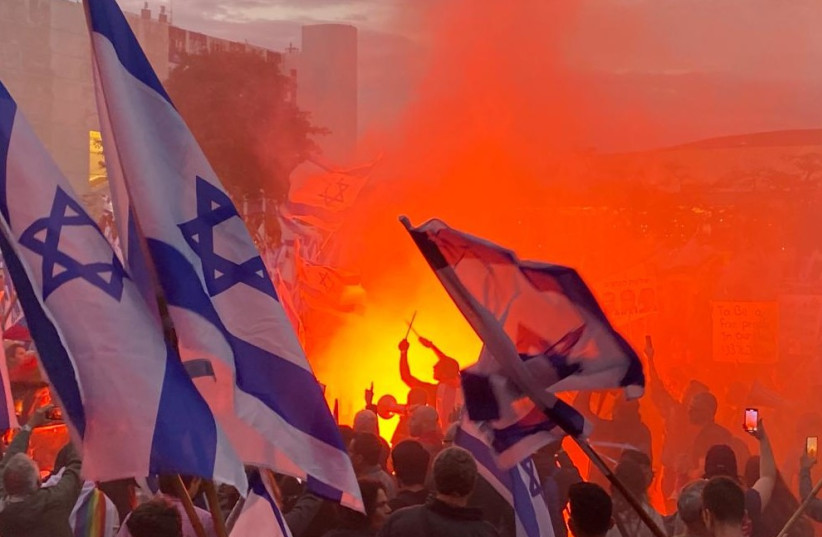We’re still in mid-drama. But last Monday may have been a high point in Israel’s 75-year-old historic experiment in Jewish-democratic governance.
Sometimes, history derails you and sometimes you can derail history. Protests are mass attempts to hijack history and force change through people power. Democracy prefers less-disruptive interventions, from voting to lobbying. Mobs unnerve us. As these fury-fueled, multi-headed, mindless beasts grow, so does the risk of violence – and the difficulty of stopping them.
Sometimes, people feel ein breira – there’s no alternative. I have criticized the protestors’ intemperance and still denounce reservists refusing to serve. But without some extremism, Prime Minister Benjamin Netanyahu’s extremist government would have caused extreme damage.
Over 600,000 Israelis mobilized, blasting Netanyahu for announcing he was firing Yoav Gallant. Yet violence was minimal. Score one for the protesters. And the government responded by creating that rare phenomenon in today’s all-or-nothing politics – a win-win for now.
For now, the coalition has idled its mad rush to neuter the judiciary. Had these conservative revolutionaries acted more conservatively, they could have already passed some reforms. For now, negotiations continue. For now, we have enough quiet to break bread – er, matzah – together over Seder, mourn together during Remembrance Day and celebrate our 75th anniversary together.

Still, the judicial issue lingers. Ministers keep behaving abominably. Ben-Gvir’s power only inexplicably grows. The pro-government forces’ frustrations that their votes don’t count is growing. And the seething religious, ethnic and political tensions persist.
So beware of predictions. Who would have imagined that Netanyahu would be so foolish as to fire Gallant? Who would have expected that so many would protest so peacefully? And, the one thing everyone knew for weeks was that if Netanyahu slowed this power grab, Justice Minister Yariv Levin would quit but Levin didn’t.
Last Monday fits some broader historical patterns. We’re a volatile people with a past pocked by political eruptions, from the 1952 German payoff outburst to the 2005 Gaza disengagement earthquake. Israeli society is a series of shotgun marriages between unlikely groups. But as with what we once called “Catholic marriages” – forever unions because the Church forbade divorce – Israelis excel at going to the edge, blowing off much steam without crossing the line.
The Israeli ethos of self-sacrifice
Once deemed the ever-dying people, we Jews have created the never-dying state. Zionists are the comeback kids of Jewish history: we get knocked down but we come up again and again. Despite living in Altneuland, old-new land, oozing history, as master turnaround artists we’re amnesiacs with whiplash. It’s hard to remember because of our Ted Lasso-like happy-making goldfish-short memories but Israelis keep bouncing back. We rebounded instantly from the Corona lockdowns and the May 2021 bombardments and riots. Most dramatically, everyone knew we’d never rebound from Arafat’s reign of terrorism or the Yom Kippur War trauma yet we did.
TOO MANY Israelis, including our prime minister, have sacrificed too much personally to sabotage this state so easily. Admittedly, that reassures us while feeding the mystery of why this bug-riddled version of Bibi 3.0 in his third go-round as premier has behaved so self-destructively.
Apparently, Netanyahu will not fire Gallant if he apologizes. Gallant should apologize for dithering so long before standing up. Gallant could also apologize for his cowardly Likudnik colleagues, still quaking before this half-Bibi, this ever-shriveling Netanyahu.
Israel’s ethos of self-sacrifice explains our patriotic protesters’ addiction to Israeli flags. The many values, aspirations, stories and enemies uniting us explain why it is reprehensible to dismiss the protesters as anarchists and the government’s supporters as fascists.
That Israeli interconnectedness is why Israeli neighbors are so intrusive, why many of us, led by President Isaac Herzog, speak respectfully about both sides, why we still rock on the happiness index and yes, why our politics so often spirals wildly but stops short of self-destruction.
Beyond Monday’s mutual de-escalation, note Bnei Brak’s CDF – Cholent Defense Force. Two weeks ago, protesters swarmed that ultra-Orthodox neighborhood. They were greeted with dollops of cholent and rousing Jewish songs. This power move – saying you don’t rattle us – was also a patriotic gesture, citizen to citizen, crossing one of Israel’s widest divides. “When dialog doesn’t take place, insults do,” a haredi Likudnik City Councilor, Yaakov Vider, explained.
Similarly, Adina Bar-Shalom recalls how her late father, Rav Ovadia Yosef, liked living in secular neighborhoods. Once, Tel Aviv’s mayor offered to block his street on Shabbat to silence the traffic noise. “What noise,” Ovadia asked, modeling the discipline and love our patchwork-quilt society requires, with so many who use our shared gift of freedom choosing to live differently than we do.
The future remains in our hands. The silent majority must act uncharacteristically by raising their voices for compromise. There’s not much public pressure pushing the polls to compromise or boost our president’s mediation efforts. Why Not? Where’s our Million Moderates’ March?
It will be easiest if our politicians ease the process by making some judicial reforms so the government can declare victory but shelving the most radical proposals, especially the override clause, so the protesters can declare victory, too.
The divisions run deep. We all must lower the tension, control the hysteria and respect our political rivals. Rather than yelling at one another, let’s talk to one another and even better, listen to one another.
As always, in healthy democracies, we the people can be the history-makers; we can be the change. We will determine whether last week really was historic, defusing the tensions or just another chapter in this saga that must end yesterday.
The writer is a distinguished scholar of North American history at McGill University and the author of nine books on American history and four books on Zionism. He is the editor of the new three-volume set, Theodor Herzl: Zionist Writings, the inaugural publication of The Library of the Jewish People (www.theljp.org).
